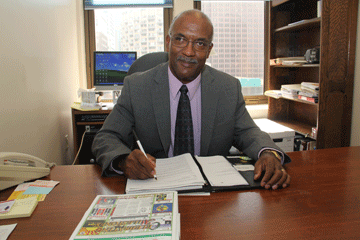The new leader of the archdiocesan Office for Black Catholics wants to evangelize the African-American community in creative ways.
“People respond to what attracts them, especially in the black community,” said Bill Bradley, newly named executive director of the office. “Whether that’s through preaching, song, liturgy, educational programs, cultural events or special liturgies like the annual St. Martin de Porres Mass, we need to be creative,” he said.
Bradley’s “do what works” approach supports his goal of “building communities with Christ-centered values.”
“Anything that brings people together to praise God is good,” he said.
The 25,000-strong black Catholic population in the Archdiocese may be small compared to other ethnic groups, but it has a long and rich history. Black Catholics have worshipped in numbers in Philadelphia since the 19th century, including for nearly a century at the former St. Peter Claver Church, and today they are present in city and suburban parishes.
[hotblock]
The Office for Black Catholics, originally the Office for the Black Apostolate, was started by Cardinal John Krol in 1980 to build “participation of the African-American community in the life of the Catholic Church.” Bradley is the eighth director of the office.
“Everyone,” he said, “has a mission to evangelize and grow the Church.”
The office coordinates the annual St. Martin de Porres Mass, celebrated this year on Nov. 6, as well as the commemoration of the Martin Luther King national holiday in January.
It supports participation in the National Black Congresses, the Effective Black Parenting program, Family Focus Day, programs for youth, and the Ministry to African-American Catholics (MAAC) program at St. Charles Borromeo Seminary in Wynnewood. An important partner in these efforts is the Peter Claver Center for Evangelization in Philadelphia.
Bradley, 59, is a fourth-year candidate for the permanent diaconate, a Knight of St. Gregory, and a product of Philadelphia Catholic schools, beginning with Most Precious Blood of Our Lord and Transfiguration of Our Lord schools in West Philadelphia, which have both closed.
He believes inner-city Catholic schools provide a moral anchor in the midst of uncertainty and urban breakdown.
In an environment where good choices are few, he said, parochial schools are the “best option for parents seeking the discipline and moral structure of a Christ-centered education” for their children. “Once you lose Catholic education in your community,” Bradley said, “what follows may be the loss of the Church’s presence.”
A participant in the 10th Synod of the Archdiocese back in 2002-03, Bradley said he pushed hard for the continued presence of Catholic schools in the inner city, which he calls “beacons of hope.”
With the closing or consolidation of many urban parish schools that once served Philadelphia’s immigrant populations, the Archdiocese strives to keep others open through a system of subsidies. The strategy reflects the Church’s commitment to the inner city despite the costs.
Bradley concedes the cost factor but believes it takes second place to “preserving Catholic education in our urban community.”
Bradley, his wife Cynthia, and two adult children are members of St. Raymond Penafort Parish in the Mount Airy section of Philadelphia. Bradley has a degree in accounting and operations management from La Salle University, and he was the parish’s business manager for 20 years.
The parish, with a diverse but predominantly African-American congregation, operates St. Raymond School with 295 students. He calls the school a “source of pride.”
Ultimately Bradley hopes to see more black leaders, both lay and religious, in the Philadelphia Church. From there, he said, more vocations will follow. The Archdiocese currently has four ordained African-American priests.
Bradley’s professional career reads like a history of Philadelphia banking, beginning with First Pennsylvania Bank, which merged with PNB, which in turn became CoreStates, then First Union, Wachovia and, finally, Wells Fargo. For the past 10 years he was controller and chief financial officer for Creative Financial Group in Newtown Square.
***
John Gillespie is a freelance writer and a member of St. Bridget Parish.




Share this story